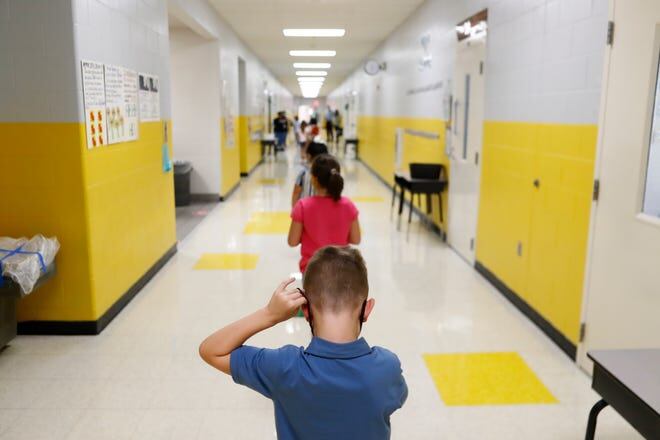Many of Tennessee’s lowest-performing students have fallen behind up to two years academically because of disruptions to schooling caused by COVID-19, several superintendents told state lawmakers on Tuesday.
And one of those district leaders called on the state to take quick and decisive steps to help struggling students catch up.
“The state needs a clear plan. We need clear actions. We need clear goals,” said Linda Cash, superintendent of Bradley County Schools in southeast Tennessee.
Cash was one of six superintendents who testified before the House Education Committee during a five-hour hearing focused on reopening schools amid a public health emergency.
Among the revelations: About half of Tennessee’s 1 million public school students are estimated to be learning virtually, although that number changes daily as coronavirus exposure and safety protocols shift many students from brick-and-mortar classrooms to online and back.
Referencing local tests administered in August to assess how much students knew after returning to class following an extended break, Cash said those who were proficient or just below proficient mostly stayed in that range. However, students at the bottom “lost a lot.”
“The most sobering piece was the lowest percentile of our students — the students that were already low — dropped two more grade levels. If that doesn’t shock you, then we need to take a real look at that,” Cash said of early data out of her 10,000-student district.
The testimony sets the course for state-level discussions about ways to support local schools as they seek to catch students up — a conversation that’s also happening across the nation as leaders consider logistics, funding, and whether there’s the political will to pursue widespread recovery.
“I look forward to making sure that we together have a really strong plan about what solutions can be,” Education Commissioner Penny Schwinn told the committee about the next legislative session that begins in January.
Schwinn said early state-level data about learning loss is concerning. She plans to release that data soon. For now, she said any proposed solutions likely will have a significant price tag and require legislative action. Those could include afterschool programs, summer school, and other strategies to extend learning time.
Asked about summer learning programs, Schwinn said she strongly supports that approach “for those students who need it most.”
Rep. Scott Cepicky, a Republican from Maury County, sponsored summer school legislation this year before COVID-19 emerged in Tennessee. On Tuesday, he noted that the number of struggling first graders in his Middle Tennessee district has more than doubled based on early testing this fall.
Cepicky and Rep. David Byrd, a Republican from Waynesboro, suggested that canceling the state’s TNReady assessment next spring might be a way to save millions of dollars to pay for learning recovery programs and also give teachers more time to teach this academic year. However, the state already has a testing contract with Pearson to provide the assessment, and Gov. Bill Lee’s administration wants to move ahead with TNReady in 2020-21.
“It’s incredibly important that we have an assessment to measure student learning,” Schwinn said. “It is also important that we have a consistent assessment so we can compare apples to apples and know how we are doing as a state.”
Superintendents testified they were using federal coronavirus relief funds to help pay for local programs to address some of their learning loss.
But Joey Vaughn, superintendent of Manchester City Schools, said one of the biggest challenges is teaching students virtually.
“Many of our virtual students are our lowest performers. Until we get them back into school, we’re going to continue to struggle,” he said.
Tennessee’s decision to close its school buildings last March means many students missed at least 50 days of classroom instruction — almost a third of the school year — because of the pandemic.
A bevy of studies show that losing time in school sets students back academically, especially those who come from low-income families, have disabilities, or are English language learners.
In June, the legislature created a special commission to develop recovery plans in the face of learning setbacks for school children, disruptions to university life, and the likelihood of more school closures. But the nine members of the commission, which is scheduled to report its findings to the legislature by Jan. 1, have yet to be named.
Rep. David Hawk, a Republican from Greeneville, said the state can’t wait for a report to begin addressing the scope of the needs.
“We can’t take another six to nine weeks and allow those students to fall even further behind. As a committee, we’ve got to push right now, this minute, to make sure those students don’t fall further behind,” Hawk said.
Besides Cash and Vaughn, superintendents who testified were Troy Kilzer of Chester County, Russell Dyer of Cleveland City, Danny Weeks of Dickson County, and DeAnna McClendon of Monroe County.
The superintendents were picked by Schwinn and Dale Lynch, executive director of the state superintendents group. But Rep. Antonio Parkinson, a Democrat from Memphis, said at least one superintendent from the state’s four urban districts should have been invited.
“I’m sure they have a perspective that would need to be presented before this body. It may be different from your perspective,” Parkinson told those testifying as he thanked them for appearing.








